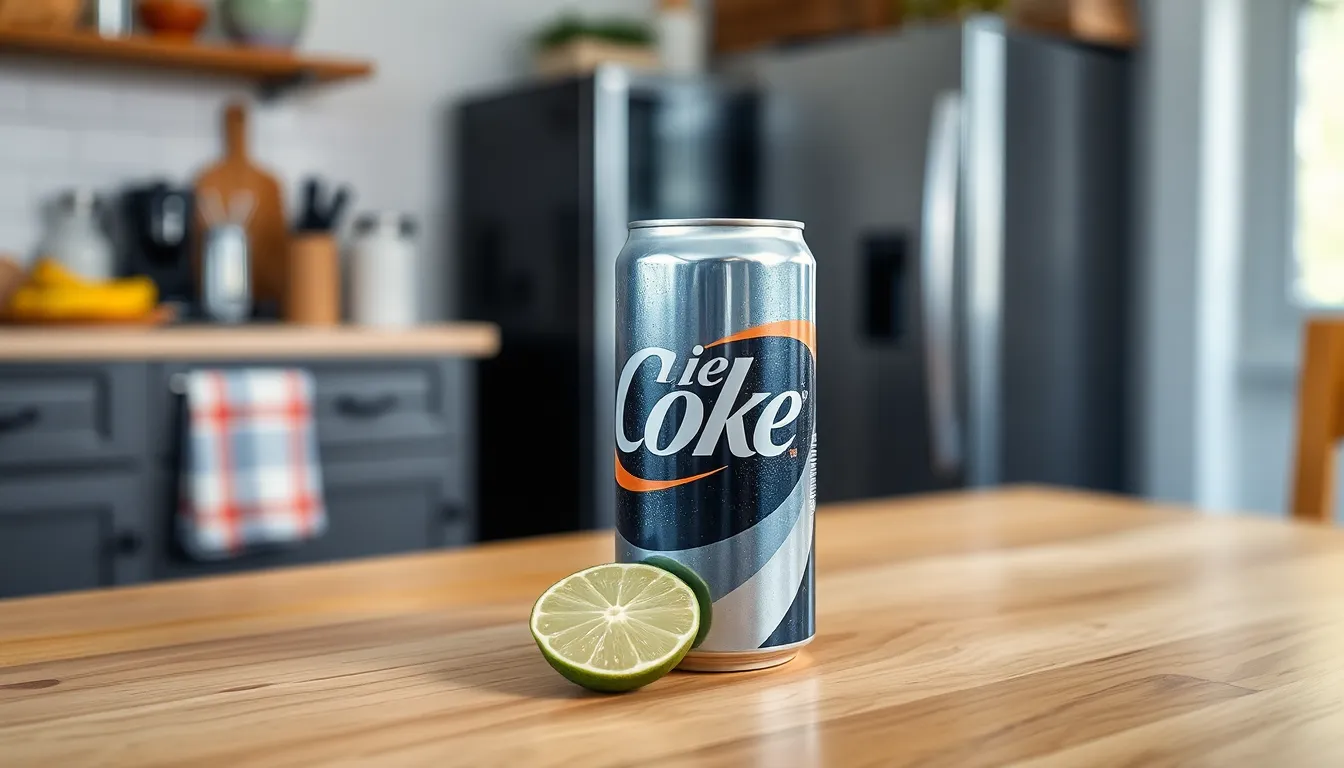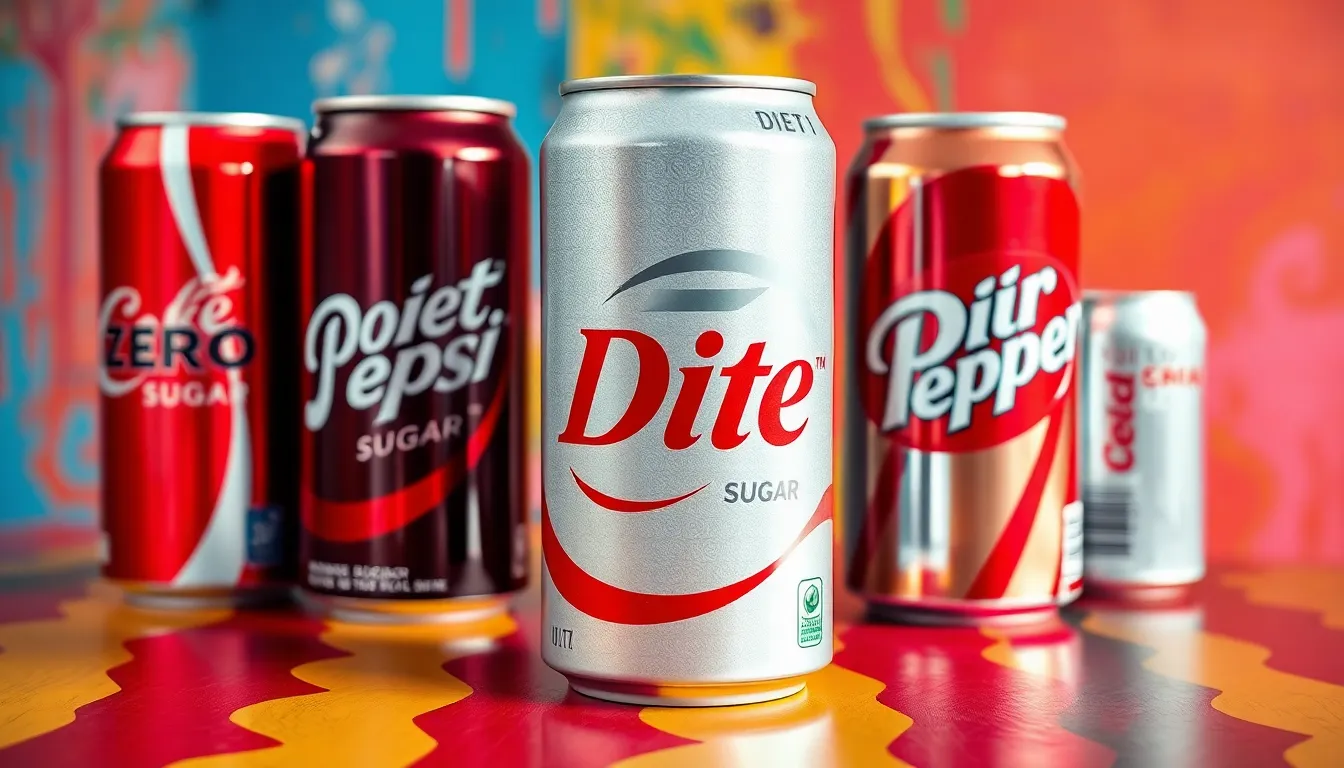Diet Coke has become a popular choice for those looking to enjoy a refreshing beverage without the calories. But many consumers often wonder about the ingredients that make up this fizzy drink, particularly the artificial sweetener aspartame. Understanding how much aspartame is in Diet Coke can help individuals make informed choices about their diet and health.
Aspartame is known for its intense sweetness, making it a common substitute for sugar in many low-calorie products. With growing concerns about artificial sweeteners, it’s essential to explore the specific amounts found in Diet Coke and what that means for regular drinkers. This article delves into the details, shedding light on the aspartame content and its implications for those who enjoy this popular soft drink.
Table of Contents
ToggleOverview of Aspartame
Aspartame is an artificial sweetener commonly used in various sugar-free and low-calorie products. It contains approximately 4 calories per gram but is used in such small amounts that its caloric contribution is negligible. Aspartame is nearly 200 times sweeter than sucrose (table sugar), allowing for reduced quantities in formulations.
In the United States, the Food and Drug Administration (FDA) approved aspartame for use in 1981. The safety of aspartame has been extensively reviewed, with studies indicating it poses no significant health risks for the general population. However, individuals with phenylketonuria (PKU), a rare genetic disorder, must avoid aspartame due to its phenylalanine content.
Diet Coke contains about 180 mg of aspartame per 12 fluid ounces. This amount can vary slightly depending on the formulation and region of production. Understanding this content is essential for consumers monitoring their aspartame intake.
Aspartame Content in Diet Coke


Diet Coke contains aspartame, a common artificial sweetener, at a specific concentration. Understanding this dosage and comparing it with other diet sodas can clarify the implications of its consumption.
Dosage Information
Diet Coke contains approximately 180 mg of aspartame per 12 fluid ounces. This level reflects its formulation for a low-calorie beverage while maintaining a sweet flavor. Variations in aspartame content may occur based on regional formulations or changes in product recipes. Tracking these differences can aid consumers in making informed choices regarding their intake.
Comparison with Other Diet Sodas
Comparative analysis shows that aspartame content in Diet Coke is consistent with many other diet sodas on the market. For instance:
| Beverage | Aspartame Content (mg per 12 fl oz) |
|---|---|
| Diet Coke | 180 |
| Coke Zero Sugar | 55 |
| Pepsi Diet | 100 |
| Diet Dr Pepper | 75 |
These figures illustrate varying aspartame levels among diet sodas. Consumers may choose based on personal preferences, dietary needs, or specific health considerations related to aspartame intake. Believing that moderation is key, individuals can responsibly enjoy these beverages while considering their unique health profiles and restrictions.
Health Concerns Related to Aspartame
Aspartame, while generally recognized as safe by regulatory authorities, raises health concerns for some individuals. Understanding these aspects is crucial for consumers.
Regulatory Approvals
Aspartame received approval from the FDA in 1981 based on extensive research. It is also endorsed by key organizations, including the European Food Safety Authority (EFSA) and the World Health Organization (WHO). These organizations affirm that aspartame poses no significant health risks when consumed within established daily intake limits, which is set at 50 mg per kilogram of body weight by the FDA and 40 mg per kilogram by EFSA. Nevertheless, continuous monitoring of aspartame’s effects on population health remains essential, especially as consumption patterns change.
Proposed Health Risks
Some studies suggest potential health risks associated with aspartame consumption. Reported concerns include headaches, dizziness, and gastrointestinal issues. Some research has linked aspartame to health conditions such as cancer and metabolic disorders, though these claims often lack conclusive evidence. The majority of scientific reviews find no causal relationship between aspartame and serious health issues at normal consumption levels. However, individuals with PKU must avoid it due to phenylalanine content, an amino acid that can be harmful in high amounts.
Consumer Perspectives on Aspartame
Understanding consumer perspectives on aspartame is vital as it influences product choices and public health discussions. The opinions vary, primarily focusing on taste preferences and perceptions of safety.
Taste Preferences
Consumer taste preferences largely shape the popularity of beverages like Diet Coke. Aspartame’s intense sweetness, being nearly 200 times sweeter than sugar, appeals to those seeking low-calorie options while preserving sweetness in their drinks. Some consumers appreciate the distinct taste of Diet Coke, attributing its flavor to aspartame, while others may prefer beverages sweetened with different alternatives like sucralose or stevia. Taste testing studies often indicate that consumer satisfaction remains high for beverages containing aspartame, contributing to its continued use in low-calorie products.
Public Perception of Safety
Public perception of aspartame’s safety significantly affects consumption patterns. Despite regulatory bodies like the FDA and WHO affirming aspartame’s safety within established limits, skepticism persists among certain consumer groups. Some individuals express concerns based on anecdotal evidence linking aspartame to headaches, digestive issues, and other health problems. Furthermore, misinformation proliferates on social media platforms, amplifying fears about artificial sweeteners. Regular surveys indicate that while many consumers trust scientific findings, a notable percentage remains wary of aspartame, prompting ongoing discussions about labeling and transparency in food and beverage industries.
Understanding the aspartame content in Diet Coke is crucial for consumers aiming to make informed choices about their diets. With approximately 180 mg of aspartame per 12 fluid ounces, Diet Coke aligns with many other diet sodas in terms of sweetness and calorie reduction. While regulatory bodies have deemed aspartame safe for general consumption, individual responses may vary.
As consumers navigate their beverage options, preferences for taste and health considerations will continue to shape their decisions. Ongoing discussions about aspartame’s safety and transparency in labeling remain essential as the landscape of dietary choices evolves.



